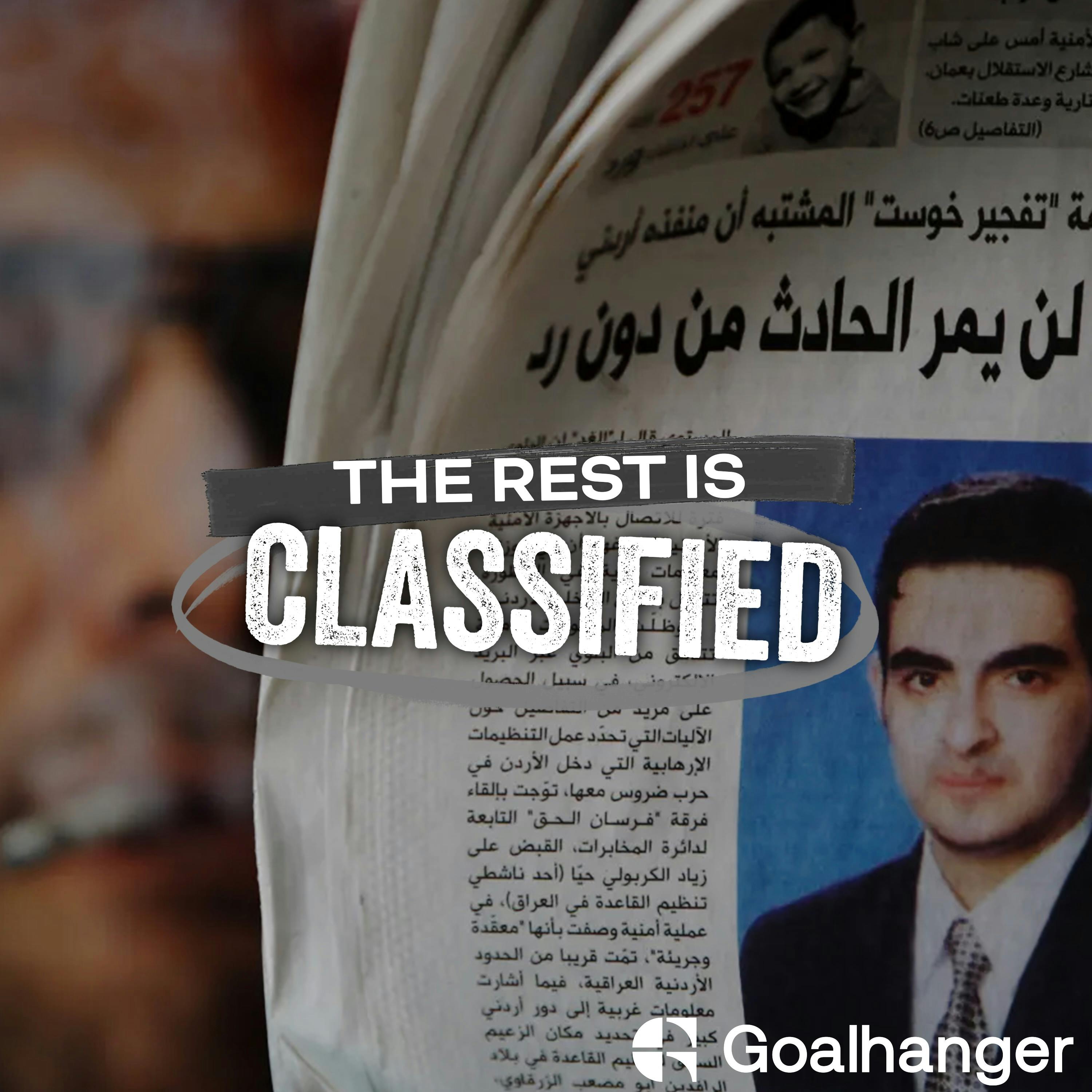Former Head of MI5: 7/7, Putin, and Al-Qaeda (Eliza Manningham-Buller)
Listen as David and Gordon sit down with former Head of MI5, Eliza Manningham-Buller, to discuss her role in investigating the 7/7 bombings and how the attacks have stayed with her to this day.
The full episode is available to members of the declassified club, sign up at www.therestisclassified.com.
-------------------
To sign up to The Declassified Club, go to www.therestisclassified.com.
To sign up to the free newsletter, go to: https://mailchi.mp/goalhanger.com/tric-free-newsletter-sign-up
-------------------
Get our exclusive NordVPN deal here ➼ nordvpn.com/restisclassified It's risk-free with Nord's 30 day money back guarantee
-------------------
Order a signed edition of Gordon's latest book, The Spy in the Archive, via this link.
Order a signed edition of David's latest book, The Seventh Floor, via this link.
-------------------
Email: classified@goalhanger.com
Twitter: @triclassified
Assistant Producer: Becki Hills
Producer: Callum Hill
Senior Producer: Dom Johnson
Exec Producer: Tony Pastor
Learn more about your ad choices. Visit podcastchoices.com/adchoices
Press play and read along
Transcript
For exclusive interviews, bonus episodes, ad-free listening, early access to series, first look at live show tickets, a weekly newsletter, and discounted books, join the Declassified Club at therestisclassified.com.
This podcast is brought to you by Carvana. Carvana makes car selling fast and easy from start to finish.
Enter your license plate or VIN and get a real offer in seconds, down to the penny.
If you accept, Carvana will will come pick up your car from your driveway, or you can drop it off at one of our car vending machines. Either way, you get paid instantly.
It's fast, transparent, and 100% online. Car selling that saves your time.
That's Carvana.
Carvana. Pickup fees may apply.
You're deep into your favorite true crime binge. The twist, the theories, and suddenly, hunger hits.
Grab a Paleo Valley 100% grass-fed beef stick.
These aren't your average gas station snacks. They're made from real beef sourced from regenerative, small American family farms.
No preservatives, no gluten, no grains, soy, or sugar.
Just naturally fermented protein that fuels your obsession. Whether you're road tripping, hiking, or pulling an all-nighter with your favorite case.
Choose from five bold flavors, original, jalapeno, summer sausage, garlic summer sausage, and teriyaki. They're keto, paleo, and carnivore-friendly, made to work with your lifestyle, not against it.
With over 55 million sticks sold and a 60-day money-back guarantee, you've got nothing to lose. Get 15% on your first order at paleovalley.com.
Just use code Paleo at checkout.
This episode is brought to you by Progressive Commercial Insurance. Business owners meet Progressive Insurance.
They make it easy to get discounts on commercial auto insurance and find coverages to grow with your business. Quote in as little as eight minutes at progressivecommercial.com.
Progressive Casualty Insurance Company, coverage provided and serviced by affiliated and third-party insurers. Discounts and covered selections not available in all states or situations.
Hello, listeners. We've got something very exciting for you today that we are absolutely thrilled about.
What you're about to hear is an extract from this week's bonus episode, which is an interview that we conducted with Eliza Manningham-Buller, the former head of MI5, in which, among many other fascinating topics, she discusses her face-to-face meeting with none other than Vladimir Putin in the immediate aftermath of the 7-7 bombings and the outrageous way that he behaved in some of the meetings afterward.
Now, every week, our members get exclusive access to bonus episodes just like this. So far, we've had interviews with someone on the team who hunted bin Laden when Iran-Israel was all over the news.
We spoke to a former CIA officer who worked basically just on the Iran target. We've done episodes where we answer your questions, done film reviews, including on Zero Dark 30, then a live stream.
And coming up, we've got interviews with two former, two former directors of the CIA.
Members also get access to discounted book lists, special prize draws, early access to episodes, ad-free listening. and a whole lot more.
So here's our interview with Eliza.
If you want to hear the full episode, just sign up at the restisclassified.com.
One of the things mentioned before we start recording is that you actually met Vladimir Putin around this time because he'd been in Scotland, hadn't he, for the G8 summit with the Prime Minister at Glen Eagles, which this attack might have been timed for that summit.
It's one of the possibilities, isn't it? But then you met him shortly afterwards, is that right? Yes, he was still in London and he came to Cobra and the
senior person in the Met who was dealing with this and I gave him a briefing on the state of the investigation, which was at that stage pretty preliminary. And
he was clearly hostile to me and said something like, it's the duty of people like you to stand between the terrorist and their victim and you failed. So well it wasn't a very successful meeting.
What did you say back?
I suppose it's hard to argue back. I was being very polite.
Is that the only time you met him? Yes. What was your impression of him? Rather sinister-looking eyes.
Yeah.
And I guess it wasn't that long after that that he killed Zelexander Lipinenko. It was within a year.
And I can't remember which year it was.
He said that the greatest tragedy of the 20th century was the collapse of the Soviet Union, which is sort of breathtaking comment when you think about it. Yeah.
But it's amazing, isn't it?
A year after basically coming down, talking to the Prime Minister, meeting you in a Cobra, he's ordering polonium attack on the streets of London or involved in it.
I always assume, I have no evidence of this, that it was such a risky thing to do in some respects, that I think they must have done it somewhere else and it not been noticed so that they could say it's safe to do this in London.
We've done it somewhere else. Oh, it's a huge polarity.
I don't know that, but I've often wondered that, because otherwise it's quite a dangerous thing.
I mean, there have been rumours that other people in Europe or even in Russia died with symptoms similar to Liponyenko. So the assumption is that they thought they could do it without it being traced.
I think so. We also spent some time on the pod talking about 21.7, the couple weeks after 7.7, this other attempt using very similar explosive devices.
We talked about it this way as maybe inside MI5 potentially being more of a shock in some ways.
Maybe a sense of, well, we didn't have the intelligence to prevent 7.7, but maybe we should have been able to prevent 21.7.
I'm curious for your thoughts on how it felt and whether it was maybe worse in some ways. Well, first of all, you always know you'll never prevent everything.
I think the number that are prevented, where it's been made public, vastly outweighs those that should not.
My recollection of 21-7 was a feeling of
gloom.
Nobody died. There was none of the tragedy of 7-7.
But I do recall
feeling that if this happened every two weeks, we would be really stretched to deal with it. Of course, all the perpetrators were eventually arrested and went to prison.
So to that extent, it was a successful operation. Even from the terrorist point of view, the fact the detonators didn't work was fortunate.
But it must have been a thought inside MI5.
What if this is going to happen every two weeks? Exactly. And we were quite relieved when two weeks later in August, the date passed without anything.
Without anything happening.
Eventually, it does look like there is a link back to Pakistan and to Al-Qaeda in both of those plots. But that took some time to become a psychological.
I think that was after I retired that came.
Al-Qaeda is an inspiration. It doesn't have to direct things.
I mean, the fact that Mohammed Sadiq Khan went back to Afghanistan, clearly there was some connection there.
But we had plenty of plots which were inspired by the narrative which bin Laden and al-Qaeda were promoting. And if they can self-start, they didn't need to be directed.
And I think you've spoken previously that you think the Iraq war did contribute to that radicalization, and that you'd said that before the war as well, I think, at MI5.
I think that before the war, the JRC had
government, the Joint Intelligence Committee, that there would be a likely increase in terrorism.
It doesn't follow that because there might be an increase in terrorism, it's necessarily wrong to do what you're planning to do.
But we know that it was a contributor because of the video wills we recovered, including the following year of the airlines plot, Operation Operation Avert,
where people particularly instanced this. And yes, it was a contributor.
Yeah, because it was politically difficult at the time, I think, for government to acknowledge that. Except that.
I would point out that in 2006, I made a speech where I said this with the approval of the government, because as you know, public servants don't make public speeches without the approval of the government.
It would be chaotic. Was that that one in London, Queen Mary's, or was that a different one? Yes, I remember being there for that one a long long time ago.
So, I mean, as we kind of, I guess, come to the end of this section on 2005, how much do you think it changed MI5? I mean, what was the legacy of the attacks for it as an organisation?
I'm not sure legacy is the right word because
throughout its history, any organisation is affected by what it has to deal with.
When I joined the organisation, height of the Cold War, the main preoccupation was what the KGB and the Warsaw Pact allies were doing. And then it preoccupation became terrorism and and it moves on.
We were, as I mentioned, already in the middle of a big expansion as a result of 9-11.
And I believe the organisation is self-critical and constantly trying to get better at what it does. And so I think one of the implications and results of 7.7
is
how can we get better? How can we give government greater confidence of covering more of the problem?
How can we maximise the chances of preventing this happening again? How can we gear up?
But anybody who's involved in intelligence knows that there's no such thing as 100% security and it's deeply disappointing when this sort of thing happens, more than disappointing, it's appalling.
But you know that there could be another attack next week which has not been seen, has not been anticipated.
And so the imperative to continue to try and improve, to adapt to the threat, to adapt new technology, to widespread encryption, all these things are challenges. Thanks for listening.
To hear the full episode, just sign up at the restisclassified.com.





